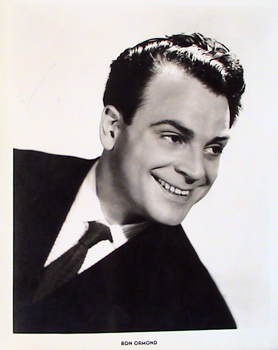Ron Ormond (Ron Ormond)

Ron Ormond was born Vittorio Di Naro, anglicised to Vic Narro. He took his surname from his friend the magician and hypnotist Ormond McGill. Ron Ormond married the vaudeville singer and dancer June Carr (1912–2006) six weeks after he met her when they were performing on stage in 1935. Ormond was performing as a magician calling himself “Rahn Ormond” and was acting as the master of ceremonies of the show leaving town as June watched the last performance. She said to her friend sitting next to her, “See that guy, I’m going to marry him.” They remained married until his death. They became partners in film production and had two sons; the first son, Victor, died of pneumonia, and their second son, Tim, appeared in several of their films. June Ormond’s father actor, former nightclub owner and burlesque comic Cliff Taylor, also appeared in many of the Ormond’s films. Ormond’s first film was as an uncredited technical director on The Shanghai Cobra (1945). Ormond formed Western Adventure Productions, Inc in 1948 and formed a partnership with Lash LaRue writing and producing and eventually directing his films. Ormond’s first credit was Dead Man’s Gold in that year. Ormond made his directing debut in King of the Bullwhip with La Rue in 1950. Ormond also wrote a series of Westerns starring former Hopalong Cassidy sidekicks James Ellison and Russell Hayden and filmed vaudeville acts for a film released by Robert L. Lippert. Western Adventure also acquired re-issue rights to a number of Hal Roach’s Laurel and Hardy comedies, and distributed them along with their own productions.
As B picture Westerns became replaced with Western television series, Ron Ormond moved into other exploitation genres with films such as Mesa of Lost Women, Untamed Mistress, Teenage Bride aka Please Don’t Touch Me and country and western films such as White Lightning Road and 40 Acre Feud. During the 1950s, Ormond spent eight months with Ormond McGill in Asia writing the book Religious Mysteries of the Orient/Into the Strange Unknown that centered Western attention on psychic surgery. Other books by McGill and Ormond include The Master Method of Hypnosis, The Art of Meditation, and The Magical Pendulum of the Orient. Ron Ormond also produced roller derby on television for Leo Seltzer for a year with his son Tim as one of the players in the children’s version of the sport. Tim loved it, Ron, not so much. At the time, roller derby was big business, at least for Leo Seltzer, who was a big land owner in San Fernando Valley; he owned orange groves and lived in a gated home. Ormond managed the derby which held weekly skate-offs at the Olympic auditorium in downtown LA. The skaters who had kids and young Tim skated in a kid’s league, which was not the type of hard contact contest which the adults engaged in, but was mainly for the fans before the main match. Ormond ended up leaving the Derby after telling Sletzer, “I can’t work for you and still remain your friend, and I consider you a good friend.” This ended that segment of Ormond’s life.
After making more exploitation films such as The Monster and the Stripper and The Girl from Tobacco Row, Ormond’s survival of a plane crash led him to a conversion to Christianity. Ron Ormond’s productions after that include 39 Stripes, produced for Ed Martin Hope Aglow Ministries, If Footmen Tire You, What Will Horses Do?, The Burning Hell and Believer’s Heaven (for Estus Pirkle), The Grim Reaper produced by June Ormond, aka June Carr, as well as Surrender at Navajo Canyon for Pete Rice, and a travelogue for Dr. John Rice. The Second Coming was next on the agenda, but Ormond died of cancer before production. The script was written by Tim Ormond, and produced by him and June Ormond. The film is dedicated to the memory of Ron Ormond and John Rice.
Born
- August, 29, 1910
- USA
- Baldwin, Louisiana
Died
- May, 11, 1981
- USA
- Nashville, Tennessee
Cemetery
- Bill Rice Ranch Memorial Park
- Murfreesboro, Tennessee
- USA


